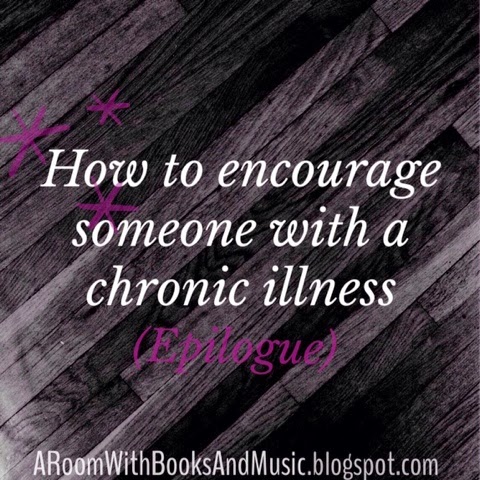"What's the best way to encourage someone with a chronic illness?" When a friend asked me this question, I had no idea how hard it would be to answer! I started to answer it
here and
here. Today, I want to get to the heart of the matter and take a deeper look at emotions.
6. Celebrate with them.
Celebrate?!? What?! How can you celebrate with someone who has a chronic illness when...they have a chronic illness?! And herein lies the problem. Just because someone has a chronic illness does not mean that they have nothing to celebrate! (By the way, if you think that the above scenario is outrageous and unlikely, I've been on the receiving end of such an attitude...It's very uncomfortable.)
It can be easy to imagine being there for someone with a chronic illness during the hard times. But they need encouragement in the good times as well! Nothing is more of a downer as when I am taking a moment to celebrate something great in my life, and someone looks at me with pity and says, "I'll be praying for your lupus." WHAT?!? Are you kidding me?! If I just told you something good, even if it's a little thing, don't pity me! Celebrate with me! Sometimes, having a good day can be a big victory, so don't brush those days under the rug as though they don't matter. Celebrate the good days! Celebrate the good things that happen in the midst of bad days! Celebrate the happy things that have nothing to do with illness! When you celebrate with someone who has a chronic illness, you empower them to have dignity, to see their worth as a person, and to experience the joy of living.
(Please note that there are many people who are depressed as a result of or as a symptom of their chronic illness as well as many who are not. Treating someone who is depressed as though they just shouldn't be or with a dismissiveness towards what they are experiencing just adds to the discouragement. The flip side is true: Treating someone who is not depressed as though they are can also be a cause for discouragement. Just don't assume either way and make sure to take the time to listen.)
Now back to the business at hand. Celebrating with someone who has a chronic illness depends on a basic understanding...
7. Understand they have a full range of emotions.
Most of the time, I'm smiling. It's not a facade. I'm a genuinely, very happy person. I tend to be happy most of the time even when I'm in extreme pain or going through a lot. I am also an extremely expressive musician to the core of my being. My ability to express such deep emotion on stage flows from a life that feels deep emotion on many levels in all aspects of my life. I experience life to the fullest with joy amidst all the highs and lows. Yup. Joy. And lows. There are lows. (Who doesn't have lows from time to time?) So you know what hurts me? It hurts when someone sees me on a day when it's hard to smile and says, "I think you need therapy to learn to cope." Really?! I am in intense pain 100% of the time, I'm bubbly and happy 90-something% of the time, and you think I need to learn to cope? Let me feel all my emotions without guilt!!!! I'm not saying that having lupus gives me a pass to act however I want or to be a Debbie Downer, but don't make me feel like there's something wrong with me just because I go through some hard times.
People who live with chronic illness are not any one emotion 100% of the time. No one is! Just because they are sad one day does not mean they are sad all the time and need counseling. Just because they are happy most of the time doesn't mean they don't ever cry or go through hard times. Just because they exhibit strength most days does not mean that there aren't also times when they are weak. Just because they are smiling does not mean they are not in pain. Just because they are in pain does not mean they are also emotionally hurting. If they are having a string of bad days, they may be just one day away from experiencing a good one. And if they're having a string of good days, they may be just one away from a not-so-good day.
So what do you do with all of this understanding?
You empathize. Empathy isn't just something you do when things are going bad. So empathize during the smiles and the tears, the hard days and the good days, the sad times and the happy times. But don't stop there...
8. Live life with them.
A lot of the experiences that have encouraged me the most have had little or nothing to do with lupus. I'm talking about the times when people have simply lived life with me. It can be anything from church, a football watching party (Can you tell that I'm not really a sports person?), or a dinner out with friends. Even though I'm a hardcore introvert, being with people helps keep me going. When I'm alone, it's really easy get wrapped up in my pain or how tired I am. Time alone is the perfect incubator for insecure, sad, and even some scary thoughts. I can get pretty self-absorbed when I'm by myself. Too much time alone isn't good for my spirit or my health. But living life with other people has a way of helping me feel some sense of normalcy and making me feel vibrant again.
Before I continue, let me explain what a sense of normalcy is not. A sense of normalcy is not the same as acting as though everything is completely normal. For me, normal is what my life was before I had lupus. If I try to act like my life is normal, then I'm living a lie. The moment I found out I have lupus, normal went out the window.
A sense of normalcy is the feeling that I am still me. The feeling that life isn't over. The feeling that I can have relationships, and fun, and conversations that go on and on until too late at night. The feeling that I can still laugh. (I tend to laugh more when I'm with other people.) The feeling that I can still tell awesome stories. The feeling that I can still be a friend. Even the feeling that I can still be a useful part of society. I can't make myself feel these things on my own. These are things that are hard to feel. And they're so easy to forget. But when I'm with other people, I start to remember. And when I remember, I start to feel like me again. And what could be more encouraging than that?






